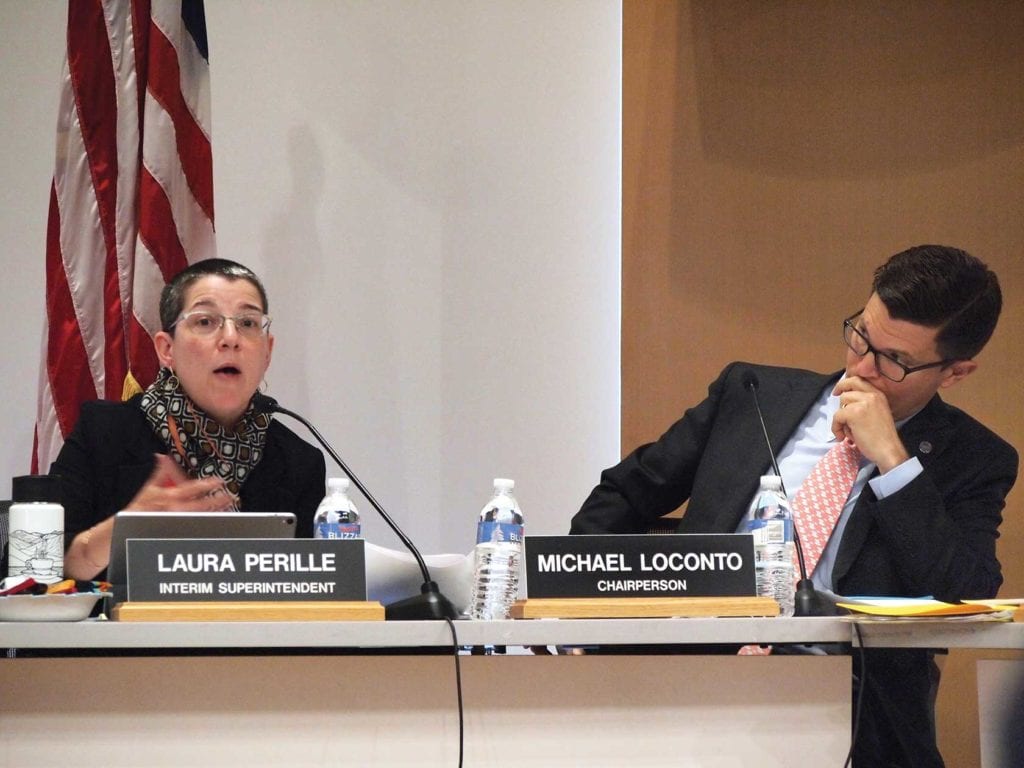
In one of the more dramatic moments in recent memory at a Boston School Committee meeting, Chairman Michael Loconto locked horns with parent activist Maria Cristina Blanco as the latter attempted to deliver testimony over the committee’s two-minute time limit.
Loconto summoned a security guard to prepare to remove Blanco from the School Committee chamber before she ended her testimony.
Blanco sought to highlight what she said was the committee’s error in moving to approve a merger between the McCormack Middle School and the Boston Community Leadership Academy -— on whose parent board Blanco sits — without seeking or obtaining approval from the school’s governing board. Although pilot schools such as BCLA are required to gain approval from their governing boards before making major changes, Blanco said the BCLA board has not yet taken a vote on the merger.
“We said we want a chance to approve or reject the plan that comes out of the design committee,” Blanco said as Loconto spoke over her. “Otherwise you are completely abrogating our status as a pilot school.”
“This is your last clear warning,” Loconto said after ordering Blanco’s microphone cut off. “You will finish speaking now or you will be removed by officers.”
Blanco concluded her testimony with an officer standing nearby.
The heated exchange came as many are debating the efficacy of the appointed school committee. Appointed by the mayor, the members often vote unanimously and haven’t blocked a policy change or initiative proposed by a mayor or superintendent in recent memory.
“It was very telling about the state of affairs,” said Ruby Reyes, executive director of the Boston Education Justice Alliance. “How much engagement can there be if your leadership can’t have a discussion?”
Members of the community may address the committee and deliver testimony limited to two minutes. Rarely do School Committee members question those giving testimony in the kind of back-and-forth deliberative debate seen when people deliver testimony before the City Council or before legislative committees at the State House.
The discontent with the appointed school committee isn’t limited to parent activists. Of the seven City Council candidates who attended a forum held by JP Progressives last week, all called for changes to the structure of the body, with four saying they would favor a hybrid elected/appointed committee, two calling for a fully-elected committee and council Education Committee Chair Annissa Essaibi-George calling for a board with four seats appointed by the City Council and five appointed by the mayor.
Essaibi-George said the important thing is for the committee members to be responsive to parents and others who come before them.
“It’s critical that our families feel welcome to participate in School Committee meetings,” she told the Banner, noting that she has sometimes gone over the two-minute limit but has never had security called on her. “Let the parents finish their testimony. To call in school police creates a very negative atmosphere.”
At issue: grade reconfiguration
At last week’s meeting, several activists asked that the School Committee refrain from voting to approve a grade reconfiguration plan that would change some schools to K-6, alter how students are assigned to schools and lead to the closure of all middle schools, and could lead to the closure of some K-5 schools.
Parent activist Mary Battenfeld said the district’s grade reconfiguration plan could have a disparate impact on low income students and said there are too many unanswered questions in the impacts of the planned changes.
“What we are asking is that you wait until our new superintendent comes on board, that you review some of these questions and that you not vote on the overall grade reconfiguration,” she testified, before the School Committee members voted unanimously to approve the reconfiguration plan.
“Up to this point there has been no community discussion on the pros and cons of middle schools,” BEJA’s Reyes testified. “The ramifications of closing middle schools would disproportionately impact black and Latino students at higher rates because middle schools are majority black and Latino students.”
Reyes called for an equity analysis on how the closure of middle schools would affect black and Latino students.
Reyes also repeated a call she has made previously, asking that the School Committee members pass a resolution in support of the Promise and Cherish acts currently under consideration in the state Legislature. The former act would increase state spending on local school districts. The latter would increase funding and freeze tuition hikes for public colleges and universities. School Committee members have not responded to Reyes’ request.
Reyes told the Banner that BEJA supports an elected school committee.
“Because democracy,” she said. “Literally, the entire state has elected school committees.”


![Banner [Virtual] Art Gallery](https://baystatebanner.com/wp-content/uploads/2024/04/Cagen-Luse_Men-at-store-e1713991226112-150x150.jpg)



